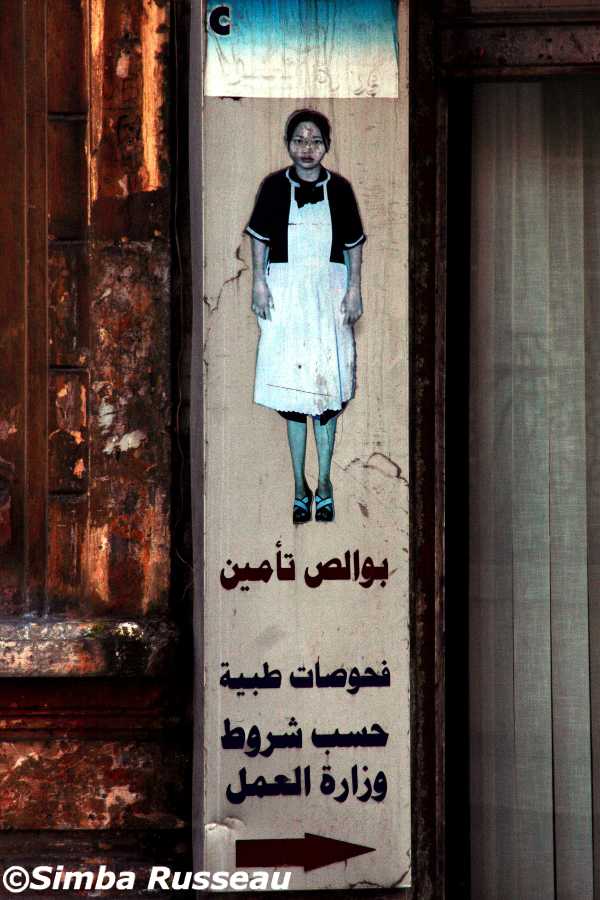COMMUNITY VOICE: The New Slavery

COMMUNITY VOICE:
The New Slavery
Domestic Workers in Lebanon
Simba Shani Kamaria Russeau
Domestic workers, the majority of whom are women, constitute a large portion of today's migrant worker population. The International Labour Organization (ILO), estimates nearly 19 percent of Lebanon's population is domestic workers. These workers send remittances home and contribute significantly to the national incomes of many labor-exporting countries in Africa, South and Southeast Asia. Female migrants are dually vulnerable because of their gender and migration status. Free Speech Radio News' Simba Russeau brings us an exposé on the conditions of women migrants working as domestic workers in Lebanon.
The Beirut Slave Trade
Loud screams fill the air during the early hours of Sunday. It's Angelique crying for the police as she runs to the balcony pleading for help. Neighbours from the surrounding buildings come outside curious of the noise that has interrupted the morning silence.
A man's voice can be heard on the background yelling Angelique's name and swearing in Arabic and French. Twenty minutes later the old man who takes frequent smoke breaks and usually sits on that same balcony during the day closes all the binds to the house.
Angelique's screams from inside the house can still be heard as well as sounds of fists and open hands hitting flesh. Several minutes later there is silence.
"I have only six months left and then I will go back to the Congo," says Angelique. You see, Madame, she cut off all of my hair. Everyday I clean and cook. I sleep on the floor in the kitchen and I can't take anymore of this life."
Due to the ongoing conflict in her country, Angelique, 26, traveled from the Democratic Republic of Congo to Lebanon to become a domestic worker on a 6-year contract. She is confined to the apartment of her employers, awakened daily at 5:30 in the morning and subjected to eighteen hours of back-breaking labor without break.
"Even the dogs are allowed to go out but we're stuck," she says from across the balcony. "We're like slaves here."
The plight of domestic workers in Lebanon rose to the spotlight during the summer of 2006, when Israel launched a thirty-four-day military offensive on Lebanon.
In Arabic, the term "Abed" is used to denote a "black" person or "slave" and the word is sometimes heard in reference to Africans or Sri Lankans. Non-Arab Afro-Asian migrants in Lebanon are physically looked upon as inferior due to their positions as servants.
These workers remain excluded under Article 6 of Lebanese labour laws and are often victims of abuse by both employers and agencies.
Creating their own support
The lack of protection for migrant workers--by their governments and host countries alike--has prompted freelance domestic workers in Lebanon to create a number of informal networks and makeshift community spaces for women who are seeking refuge after fleeing their employers' homes.
"Recruitment agencies from our home countries are tricking new domestic employees by telling them that they will have a great job, with a high paying salary and the ability to save money and provide for their families," says Aimee, a freelance domestic worker from Madagascar.
"But then they arrive to a big surprise and realize that it was all a lie."
Originally from Madagascar, Aimee has been a domestic worker in Lebanon for eleven years.
Like all other migrant women, Aimee came to Lebanon and worked under a three-year contract. She said she was lucky to become a freelance domestic worker after her contract ended.
At that time, she had the choice of signing another contract through an agency but instead, she decided to work as a freelancer. She found a Lebanese person who agreed to sponsor her work papers.
However, she explains, working as a freelancer has its disadvantages. Working independently means dealing with Lebanese who, using their sponsorship as a leverage, may try deceive the workers and take a lot of their money.
Aimee was involved in social work in Madagascar so it was not unusual for her to respond when women from Madagascar, Africa, the Philippines and Sri Lanka started seeking her assistance.
"Sometimes I wonder how I managed to put myself in the position of the social worker, but I saw my people in such distress," stressed Aimee.
"The employer has all the rights and it causes the women to become distressed, mad and depressed--which leads to suicide. So this is how I get the strength to continue."
Treating illness
In Azuniyeh there's a hospital for migrant women who are diagnosed with tuberculosis. Most of these women were dumped at the hospital by their employers and left without pay. The employers give the women's passports to the agencies that hired them. The agencies, in turn, used those passports to contract the women to other potential Lebanese sponsors.
One woman, who chose to remain anonymous, is frail, breathes with difficulty and is too weak to even get out of bed. She says that her former employer found out that she was ill and took her to the agency who then took her to the hospital.
"My employer gave the agency my passport and now they are giving me two weeks to recover from tuberculosis because they say I have to report to my new employer," she says. "To ensure that my new employer is unaware of my illness the agency told me that I will not be able to continue medication once the new employment begins."



